King James I:
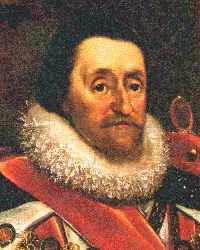
King Charles I:
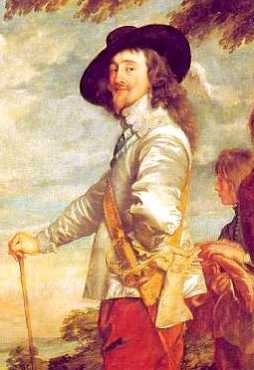
Archbishop Laud:
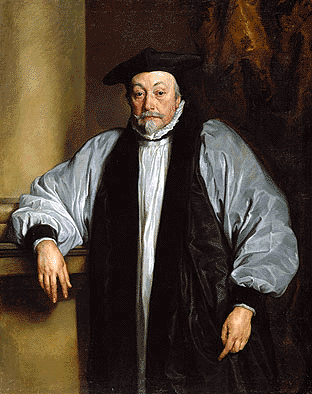
Oliver Cromwell:
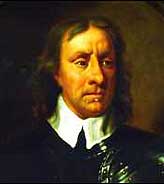
Charles II:
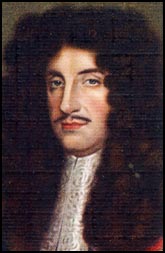
James II:
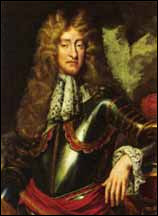
Mary II:
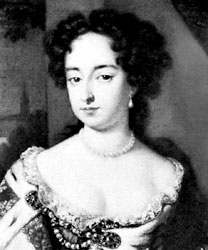
William III:

Richard Baxter:

Sidebar on: The Westminster Confession
(Click here for the text of the Westminster Confession)
The word "all" was omitted from Article 2 to allow for the view that Christ had not died for all. A phrase was added to Article 3, "continuing in the state of the dead and under the power and dominion of death" to suggest the Calvinist notion that Christ had suffered the punishment of the damned. In Article 6, the mention of the testimony of the church to the canon of Scripture was omitted, as was mention of the deuterocanonical books; there was a new stress on the inspiration of Scripture rather than its canonicity. Article 7 on was changed to make the civil precepts of the law of Moses binding. Article 9 on Original Sin was substantially altered, so that original sin consists of the "first sin imputed" as well as of inherited corruption"; the phrase "very far gone from original righteousness" was replaced by the phrase "wholly deprived" of it; the human being is of his own nature inclined only to sin; the word "regenerated" was substituted for the word "baptised"; the wording was improved to make clear that concupiscence is "truly and properly sin". Article 10 was expanded with a clause about the preventing grace of God as "working so effectually in us, as that it determineth our will to that which is good", that is the irresistibility of God's grace. Article 11 on Justification was expanded with an explanation of the mode of human acquittal: "the whole obedience and satisfaction of the Saviour is by God imputed to us, and Christ with his righteousness apprehended and rested on by faith only." In Article 13, "works done before the grace of Christ and the inspiration of His Spirit" was changed to "works done before justification by Christ and regeneration by His Spirit." When Parliament became more determined, this project was abandoned and a wholly new statement, the Westminster Confession, was adopted for Scotland in 1647 and for England in 1648. The Assembly also produced a Directory of Public Worship, which replaced the Book of Common Prayer and the two Westminster Catechisms.
When compared to the Thirty-Nine Articles, the Westminster Confession presents a more confident and positive position, incorporating most of the advanced doctrinal convictions of the past several generations. All and only the books of the Old and New Testament (i.e., not the Apocrypha) are declared to be inspired by God, who is called the "author" of scripture. Through the "inward work of the Holy Spirit bearing witness by and with the word in our hearts", the Assembly acknowledged "full persuasion and assurance of the infallible truth and divine authority of Scripture", which is the "supreme judge" by which all controversies of religion are to be determined. (Chapter 1) Double predestination and the Covenant of Works and the Covenant of Grace are affirmed. (Chapters 3 & 7) Atonement Limited to the elect is suggested. (Chapter 8) Sanctification is affirmed as well as Justification. (Chapters 11 & 13) The Perseverance of the Saints and Assurance in the faithful are both asserted. (Chapters 17 & 18)
1. Politics and religion in Britain and Ireland
The Seventeenth Century
1. Politics and Religion in Britain and Ireland
Introducing James I:
The pressure for further changes in the institutions of the church
in England and Ireland continued in the seventeenth century. Generally
these changes were resisted by the monarchy. James VI of Scotland (1566-1625,
king of Scotland 1567) succeeded his cousin Elizabeth in 1603. James was
a learned theologian, of mostly Calvinist leanings and, at first, many
expected him to support further reform in the direction of the Scottish
church, which had been organized in a form of the presbyterian system
since 1592, although he had appointed bishops for Scotland in 1600. He
steadfastly refused to change the institutions of the English and Irish
churches, but he agreed to convene a Conference at Hampton Court Palace
between representatives of the established English practice and those
who wished further reform. Few concessions were granted by the king, (the
rubrics of the Prayer Book were modified to rule out the possibility of
emergency baptism by women!) but he did agree to sponsor a new version
of the English Bible, which appeared in 1611 and bears his name. He asserted
the notion of the divine right of kings to rule and the apostolic succession
of bishops, both views that had not been officially expressed in Elizabeth's
reign.
Changes in the Church of Scotland:
He also supported various changes in the Church of Scotland in the direction of the Church of England, including the restoration of apostolic succession to the Scottish bishops, who had been "consecrated" by presbyters in the 1570's, by insisting on consecration from the English bishops, from 1610. In 1618, he forced through the General Assembly, the very unpopular "five articles" of Perth for the Church of Scotland (enforcing re-establishment of the main festivals of the Christian year, allowing private baptism and communion, and insisting on confirmation and kneeling for receiving communion).
Charles I and William Laud:
His son and successor, Charles I (1600-1649, king 1625) pressed his father's
views more strenuously, assisted by William Laud (1573-1645) and others,
and used increasingly repressive measures to enforce his political and
ecclesiastical views. He and Archbishop Laud favoured, encouraged and
enforced a more elaborate and decorated pattern of church furnishings
and services. During his reign, the term "Anglican Church" began
to be used to describe the distinctive institutions and views of the contemporary
English Church, especially those favoured by the king and bishops and
opposed to those who wished further reform of the church and its institutions.
Opposed by the members of Parliament, he at first dismissed Parliament,
but was forced to recall Parliament and, in 1642, he faced a Civil War
in which his Royalist Army was opposed by a Parliamentary Army eventually
under the command of Oliver Cromwell (1599-1658).
Scottish prayer books and riots:
In Scotland, Charles clearly favoured the bishops, a generally unpopular move, and with the help of his Scottish allies but without the approval of the General Assembly, ordered the use in all churches in Scotland of a Prayer Book for Scotland in 1637, a book resembling the English Prayer book, with some traditional Scottish forms and practices, but generally different from standard Scottish liturgies and the Book of Common Order, and including authorization to read certain passages from the Apocrypha, now considered not to be scripture in advanced Reformed circles. Riots ensued and a concerted opposition to Charles formed and remained, although he agreed to withdraw the Prayer Book. The opposition in Scotland was not satisfied and fuelled a revolutionary conviction that led to the drawing up of the National Covenant in 1638, which included the Negative Confession James VI had been forced to subscribe in 1581, and demanded a free parliament and General Assembly, assuming a Presbyterian Church of Scotland. This movement leading to the First and Second "Bishops' Wars" was a direct antecedent of the Civil Wars, in which Scotland was eventually conquered and annexed by England, and forced to accept the policy of religious toleration of the military dictatorship.
Oliver Cromwell and the outlawing of Anglican observances:
Charles was defeated by the Parliamentary army in 1645 and eventually
executed in 1649. Although the majority of the members of Parliament favoured
the adoption of a rigidly imposed presbyterian system, the commander of
the army was in favour of a Congregational settlement and a more tolerant
policy, and each congregation was left to decide its own customs, except
that the traditional institutions of episcopacy, the Book of Common Prayer,
and Christian feasts were forbidden, and observing them harshly punished.
Cromwell brutally suppressed an insurrection in Ireland, and defeated
a Scottish army, and in 1653 dismissed the "Long Parliament".
Ruling as Lord Protector from 1653, he attempted to improve the morals
and manners of the country, destroyed surviving art and organs in churches,
and was generally unpopular for his attempted reforms and suppression
of practices he did not approve of. Cromwell encouraged a wholesale "transplanting"
of Protestant Scottish and English settlers on the land of dispossessed
Irish landowners.
Charles II and the Restoration:
In 1660, a renewed Parliament invited the dead king's son, Charles II (1630-1685), who had already reigned briefly as King in Scotland, to return as king of England and Scotland. Charles' own policy was to try to ensure a measure of religious toleration, but parliament was controlled by those who wished to restore strict uniformity of religion along the lines of the period before the Civil war. A Conference at the Savoy Palace (1661), including equal numbers of bishops and Presbyterian divines was convened by the King, but few concessions were made to the Presbyterians.
The Clarendon Code:
All reforms were reversed and the Book of Common Prayer was enforced in
England and Ireland in 1662. The restored book included several hundred
minor alterations, especially in the texts of the Epistles and Gospels,
in directions for the offertory of bread and wine, and for the baptism
of adults, but it was essentially the prayer book approved in Queen Elizabeth's
reign. A new rubric indicated that only those clergy ordained by a bishop
would be allowed to take clerical office. Those clergy who were not prepared
to make exclusive use of the book were ejected from their parishes (about
2,000 clergy) and moved into dissenting chapels, which were now to become
a permanent part of the English religious landscape. Dissenting bodies
included those who favoured a presbyterian pattern and those who favoured
the independent model. Independent chapels in time became Baptist, Congregationalist
and, eventually, Deist.
A brief episcopalian restoratoin in Scotland:
In Scotland, the episcopacy was restored and renewed, but no Prayer Book was enforced, although the Lord's Prayer, the Apostles' Creed and the Gloria Patri were prescribed for the Church of Scotland. The Scottish Book of Common Order was not restored in Scotland, and several liturgical practices that had originally come from English Independents, were made normal.
Quakers:
The Society of Friends, or Quakers, a movement founded by George Fox (1624-1691),
provided a more radical form of dissent. Quakers held that the possession
of the "Inner Light", a sense of the Divine and direct working
of Christ in the soul, freed the human being from sin, united him to Christ
and enabled him to perform good works, in a life of simplicity, purity
and truthfulness. Quakers were persecuted under the Commonwealth and even
more after the Restoration. About 15,000 suffered legal sentences; over
450 died in prison. Quakers worshipped without a set liturgy of any kind,
and without any appointed minister, believing that God would use any of
the worshippers, man or woman, as minister. They refused to take oaths
or to pay tithes and opposed "hat honour" and flattery of speech.
James II:
When Charles's brother and successor James II (1633-1701, king 1685, fled 1688) openly announced his conversion to Roman Catholicism, and began to favour Roman Catholics, he was opposed by the English bishops and parliament. Parliament invited his son-and-law and nephew William III (of Orange) to become joint monarch with his wife and cousin James' daughter Mary II, on the condition that he accept some limitations on royal power. William favoured a more comprehensive church settlement, to include all Protestant parties, but he was opposed by the bishops and parliament, and was not successful in making change in that direction. He met and defeated the army of his father-in-law at the Boyne River in Ireland in 1690, leading to further repression in Ireland, especially of Roman Catholics. In Scotland, Presbyterianism was finally given exclusive authority in the Church of Scotland, and all ministers who accepted episcopacy, were turned out. (About 650 initially turned out by the General Assembly which was drawn entirely from the south of Scotland; about 200 episcopalian sympathizers remained, in the north and east, because the Presbyterians could not force them out.)
The Glorious Revolution:
William III was succeeded by his sister-in-law, Queen Anne (1665-1714,
queen 1702), during whose reign England and Scotland were formally united
into the United Kingdom of Great Britain. A final settlement for the Church
of Scotland definitively excluded the Scottish Episcopalians who henceforth
became a separate dissenting church in Scotland, whose services differed
from those of the established Presbyterian Church largely because the
Lord's Prayer and the Gloria Patri were retained, but without a set Book
of Common Prayer. Grieving at the recognition of the wholesale pillaging
by her ancestors of church property, the queen created Queen Anne's Bounty
to receive the "annates" and "tenths", ecclesiastical
taxes that had been confiscated by Henry VIII. The proceeds of this fund
augmented the income of the poorer clergy.
2. Religious Wars on the Continent
In the 1590's, the United Provinces of Holland finally established independence from Spain. In this war of independence, Calvinism and Dutch nationalism came to be nearly identified.
In 1618 war broke out in Bohemia and the Palatinate. The war later spread to Saxony and finally to most of the rest of Europe, involving Sweden and France. At times, the war became extremely violent and destructive, and led to exhaustion in German speaking Europe. By the Treaty of Westphalia (1648), the Thirty Years' War was finally ended, and each German state took the religion (Roman Catholic, Lutheran or Calvinist) of its ruler, a settlement that lasted until the near present.
3. Synod of Dort 1618-1619
Alarmed by reading a work of the English scholar William Perkins, Jacob Hermans ("Arminius") (1560-1609), a professor at Leyden, began to articulate objections to current Calvinist positions. He was opposed by Francis Gomar (1563-1641) also a professor at Leyden. The controversy spread between their respective supporters and became a national concern within the United Provinces, only recently free of Spanish Catholic rule. The States-General summoned a Synod of the Reformed Church, to which were invited representatives from the Reformed churches of Switzerland, France, the Palatinate, England and Scotland. The Synod confirmed five "points" of doctrine against Arminius' successors, the "Remonstrants", who were not fairly represented. The five points asserted were: Unconditional election (and reprobation), Limited Atonement, Total Depravity, Irresistibility of Grace, and the final Perseverance of the Elect. Those who did not accepted the decrees of Dort were exiled or executed. Although not officially adopted in England, the decrees of Dort were usually accepted as authoritative for some time. Some English theologians, such as John Hales (1584-1656), who was present at the Synod of Dort, not as a delegate but as chaplain to the English ambassador, were shocked by the treatment of the Arminians, and impressed by the Arminians' defence of their positions, "bade John Calvin goodnight", retaining serious second thoughts about many distinctive Calvinist positions.
4. Mainstream theological developments
For the first half of the sixteenth century, there were heated debates in England about theology, liturgy and church polity, and considerable differences, all generally within a broad Calvinist framework. The principal theological figures can conveniently be grouped in a few main groupings. (1) The "godly" Nonconformist Calvinists, such as William Ames (1576-1633), criticized the ceremonies of the Book of Common Prayer and pressed for the practices of continental Reformed churches and a Calvinist understanding of the sacraments. They initially faced deprivation from office and sometimes exile but eventually gained the ascendancy in the Parliamentary period. Later, Richard Baxter (1615-91), self-taught in theology, and Edward Reynolds (1599-1676) survived to be Presbyterian Anglicans at the Savoy Conference and in the restoration Church of England. (2) Conformist Calvinists, such as James Ussher (1581-1656), and John Preston (1584-1620?), generally shared the "International Calvinist" consensus in theology, but were prepared to accept English polity and church forms, defending the surplice, the cross in baptism and kneeling for communion, and eventually arguing for a compromise in polity, a "moderate episcopal system". (3) Avant-Garde Conformists, such as Lancelot Andrewes (1555-1626) and John Overall (1560-1619), were generally allied with the religious policies of the royal court, and advocated distance from continental practices and a generally more decorated and beautiful liturgy. (4) "Patristic Reformed Churchmen" or "Ceremonialists", such as William Laud (1573-1645) and John Cosin (1594-1672) and the other churchmen who gathered around Bishop Richard Neile of Durham (eventually Archbishop of York, d. 1640), and are thus sometimes referred to as The Durham House Churchmen, followed Lancelot Andrewes in emphacising the church fathers as a corrective of both Calvin and Roman Catholicism. Hammon L'Estrange, a layman and independent thinker, and others, especially looked towards the models of ancient Eastern liturgies. Others, such as Herbert Thorndike (1598-1672) followed theological lines similar to the Patristic Reformed Churchmen. Together, the group is loosely referred to as "the Caroline Divines", although they were certainly not the only significant theological figures of the period, and differed from others less than came to be supposed later. This group gained ascendancy in the Restoration period.
Scottish theology:
Scottish theology knew parallel groupings, and included a significant minority of "avant-garde" defenders of the royal policy, sometimes called the "Scottish Patristic Reformed Sacramentalists", in addition to other majority groupings of "Confessional" Presbyterian Divines, who consistently opposed royal policy in liturgics and polity, supported the National Covenant, and Moderate Presbyterian Divines, who continued to develop very thoughtful local versions of "International Calvinism", with special attention to eucharistic practices.
5. Federal or Covenant Theology
A number of Calvinist theologians attempted to soften the impression of arbitrary absolutism given by the received Calvinist account of predestination by introducing a framework of a double Covenant, a Covenant of Works in which Adam was promised an everlasting reward for obedience, and a Covenant of Grace in which salvation is promised through the saving work of Christ. Various sixteenth century theologians, including Peter Martyr, Calvin and Bullinger had stressed the divine covenant in the debates about infant baptism. By the 1570's, the Reformed theologians at Heidelberg had enunciated the double covenant, and were followed in this in England by significant figures such as William Perkins. The model was definitively stated as a corrective to Calvinist orthodoxy by Johannes Koch, or Cocceius, a German-Dutch theologian (1603-1669) but was present in many English theologians, both those who sympathized with the establishment theologians of the reign of Charles I and those who favoured the presbyterian system. The model was incorporated into the Westminster Confession.
6. Cambridge Platonists
Between 1633 and 1688, a school of theologians flourished in Cambridge University. They included Benjamin Whichcote (1609-1683), Nathaniel Culverwel (d. 1651), John Smith (1618-1652), Ralph Cudworth (1617-1688) and Henry More (1614-1687). Rejecting the Puritan influences under which they had been educated, they argued for a more tolerant and comprehensive church position than either the Puritans or the Royalist theologians. They found a special place for human reason as an arbiter in religious matters, arguing that "the spirit of man is the candle of the Lord" (Proverbs 20.27), and claimed to derive some of their distinctive views from Neoplatonism. They consistently opposed the apparently atheistic naturalism of Thomas Hobbes (1588-1679), whose treatise Leviathan (1651) a totally naturalistic defence of political absolutism that would have supported either the Royalist or the Parliamentarian position.
7. Westminster Confession
In 1643, Parliament appointed the Westminster Assembly, a group of clerics of diverse positions, which began by attempting to revise the Thirty-Nine Articles. The revisions were generally in a Calvinist direction.
See the sidebar, left, for details of the Westminster Confession
When compared to the Thirty-Nine Articles, the Westminster Confession presents a more confident and positive position, incorporating most of the advanced doctrinal convictions of the past several generations. All and only the books of the Old and New Testament (i.e., not the Apocrypha) are declared to be inspired by God, who is called the "author" of scripture. Through the "inward work of the Holy Spirit bearing witness by and with the word in our hearts", the Assembly acknowledged "full persuasion and assurance of the infallible truth and divine authority of Scripture", which is the "supreme judge" by which all controversies of religion are to be determined. (Chapter 1) Double predestination and the Covenant of Works and the Covenant of Grace are affirmed. (Chapters 3 & 7) Atonement Limited to the elect is suggested. (Chapter 8) Sanctification is affirmed as well as Justification. (Chapters 11 & 13) The Perseverance of the Saints and Assurance in the faithful are both asserted. (Chapters 17 & 18)
8. The Non-Jurors
Although the English bishops had quarreled with and were imprisoned by James II, most of them remained faithful to their oaths of obedience to him when he fled to France and declined to swear obedience to the successor chosen by Parliament. They were thus expelled from their positions and became a schismatic group that perpetuated itself until 1779. As an independent religious body with Church of England traditions, they began to experiment with liturgical elaborations, and were themselves divided between the "Usagers", who favoured a more elaborate ceremonial and "Non-usagers" who favoured the inherited English practice. Several became noted spiritual writers, especially William Law (1686-1761), whose A Serious Call to a Devout and Holy Life (1728) remained a widely read spiritual classic to the present time.
For further reading:
Spinks, Bryan D. Sacraments, Ceremonies and the Stuart Divines: Sacramental theology and liturgy in England and Scotland 1603-1662. Aldershot, Hants, 2002.
Michison, Rosalind. A History of Scotland. London, 1970. Third edition, 2002.
WDN
June 2003